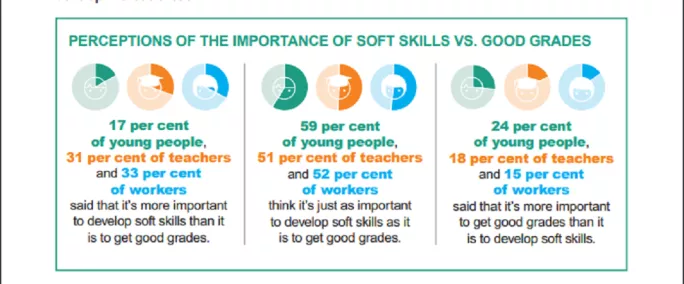Teachers are more likely to view soft skills as key to their pupils’ life chances than “good grades”, new research suggests.
The Results for Life report, published today by the Prince’s Trust and HSBC, shows that 31 per cent of teachers think it is more important to develop soft skills, such as teamwork, communication and confidence, than it is to get good grades - whereas 18 per cent think it is more important to get good grades than it is to develop soft skills. The remaining 51 per cent felt they were equally as important.
The study also reveals that 91 per cent of teachers think schools should be doing more to help students develop soft skills.
Source: Results for Life, Prince’s Trust
The report was based on a national survey of 1,000 teachers, 2,224 11-19-year-olds and 2,675 workers.
According to the survey, 45 per cent of teachers felt that a lack of soft skills was one of the most likely factors to hold students back in life, compared with 32 per cent who thought the same about a lack of good grades.
Life skills ‘overlooked’
“While young people are painfully aware of the importance of getting good grades and under incredible pressure to achieve them, this report shows that the life and character skills considered key to success in their working lives are at risk of being overlooked,” Dame Martina Milburn, chief executive of the Prince’s Trust, said.
The report’s authors also asked teachers about their concerns for disadvantaged students - 60 per cent of teachers said these students faced challenges which stopped them focusing on their studies and 46 per cent said the self-confidence of these students tended to be lower than that of other students.
And they found that the transition from primary to secondary school was a key moment for pupils - with 44 per cent of children saying their confidence dropped when they first moved up to secondary school.
Asked what schools could do to help underachieving pupils, 49 per cent of teachers suggested more small-group teaching.
The survey comes after the international rankings table Programme for International Student Assessment (Pisa) recognised the importance of teamwork by measuring 15-year-olds’ “collaborative problem-solving” skills in its latest round of tests. Pupils taking the tests were given tasks in which they used an online “chat” function to collaborate with computer-generated co-workers to solve a problem.
Want to keep up with the latest education news and opinion? Follow Tes on Twitter and like Tes on Facebook





